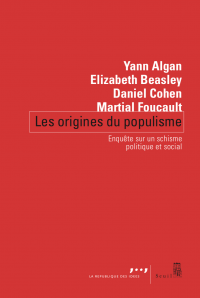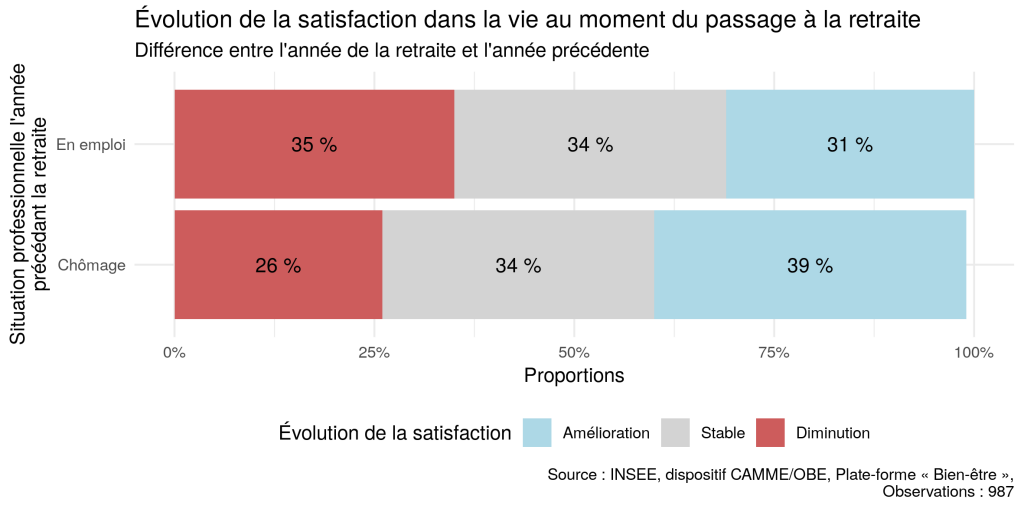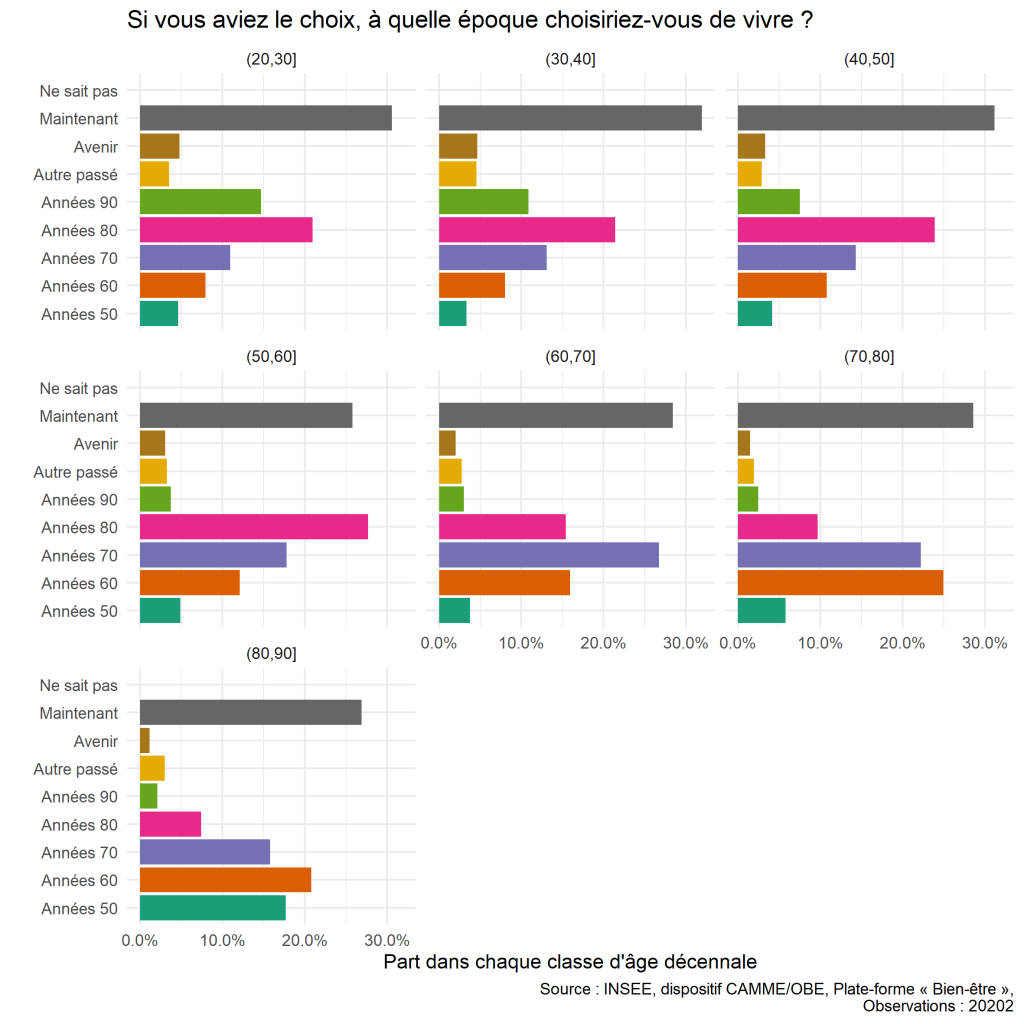En ces premiers jours de septembre, nous vous souhaitons à tous une bonne rentrée !
Vous l’avez sans doute déjà vu : l’ouvrage Aux origines du populisme, largement fondé sur la collaboration entre le CEVIPOF et l’Observatoire, est paru le 29 août dernier.
L’Observatoire fait également sa rentrée avec une note qui s’intéresse à la transition entre la vie active et la retraite : quel est l’impact de cet événement majeur sur le bien-être des Français ? Nous trouvons des résultats contrastés, en particulier en fonction de la situation professionnelle avant la retraite, et un maintien des contrastes sociaux après la retraite.
Par ailleurs, nous avons relevé cet été un nombre conséquent d’articles, dont nous espérons qu’ils vous intéresseront.
Observatoire
Les origines du populisme
L’ouvrage déploie sur une plus large échelle les éléments que nous avions présentés dans notre note du début d’année sur les Gilets jaunes. Dépassant le cadre de cette seule crise, il documente la recomposition de l’espace politique français selon des axes définis par des positionnements individuels et subjectifs, représentés par la satisfaction de vie et le degré de confiance interpersonnelle.
Yann Algan, Elizabeth Beasley, Daniel Cohen et Martial Foucault, Les origines du populisme, Seuil et La République des idées:Paris, août 2019.
Quatrième de couverture :
Le populisme est le produit de deux secousses telluriques. Premier séisme : la montée d’un immense ressentiment contre les partis et institutions politiques. Face à l’échec de la droite et de la gauche à contenir les excès du capitalisme, la radicalité « anti-système » a brisé les compromis que l’un et l’autre camps étaient parvenus à édifier. Deuxième séisme : la fin de la société de classes, au profit d’une société d’individus pensant leur position sociale en termes subjectifs. Une nouvelle polarité en résulte, qui sépare les « confiants » des « méfiants » envers autrui. La droite populiste surgit au croisement d’une double méfiance – à l’égard des institutions et à l’égard de la société. Elle prospère sur le désenchantement démocratique, tout en renouvelant le clivage gauche-droite. Fondé sur des données inédites, cet ouvrage se révèle essentiel pour comprendre le présent et l’avenir des sociétés démocratiques.
Note de l’Observatoire du Bien-être n°2019-07 : Le Passage à la retraite
Dans cette note de rentrée, nous examinons l’effet du passage à la retraite sur le bien-être des Français. Comme le soulignait déjà la littérature disponible, l’effet du passage à la retraite est ambivalent, et très contrasté selon la situation des individus avant la retraite : les salariés qui prennent directement leur retraite sont peu affectés, tandis que ceux pour qui la retraite représente une sortie du chômage bénéficient d’un gain appréciable.
Par ailleurs, nous observons que les contrastes sociaux présents avant la retraite se maintiennent largement sur la première décennie après, ne se réduisant que très lentement. Les problèmes liés à la solitude ou à un questionnement sur son utilité sociale, qu’on associe souvent à la retraite, ne deviennent aux quantitativement importants que plus tard, quand arrivent les 80 ans. Les premières années de la retraite représentent ainsi bien un troisième âge de la vie à part entière.
Madeleine Péron, Mathieu Perona et Claudia Senik, « Le passage à la retraite », Observatoire du Bien-être du CEPREMAP , n°2019-07, 03 Septembre 2019
Un temps que les moins de vingt ans…
Suite à notre brève dans la précédente Newsletter, nous nous sommes replongés dans les réponses à la question « À quelle époque aimeriez-vous vivre » de notre enquête trimestrielle. Les vagues récentes confirment ce que nous avions observé en avril 2017 : 30 % préfèrent l’époque actuelle, l’âge a une incidence sur l’époque préférée, et les générations récentes (20-30 ans et 30-40 ans) semblent avoir une image particulièrement positive des années 1980.
Dans un billet de blog, nous précisons ce constat et posons la question : qu’est-ce qui peut expliquer cette image positive de la décennie ‘80, y compris auprès de générations trop jeunes pour en garder un souvenir clair ?
Consultation de la CNIL sur les traitements de données à des fins de recherche
La CNIL est bien consciente que le Règlement Général sur la Protection des Données (RGPD) pose des questions théoriques et pratiques importantes pour la recherche. Afin de produire des guides adaptés, elle a donc lancé une consultation publique en direction des chercheurs pour mieux comprendre les pratiques existantes et les difficultés à appliquer le RGPD. Celle-ci est ouverte jusqu’au 30 septembre, et il est important que la communauté scientifique se mobilise en y répondant largement.
Consultation sur l’European Social Survey
L’ESS tient jusqu’au 24 septembre une consultation en ligne sur les évolutions de son questionnaire récurrent, afin de rester pertinente face aux évolutions du paysage politique européen.
Vu sur le Web
Consommation ostentatoire et bien-être
Le World Wellbeing Panel a publié début août un utile billet de synthèse sur l’impact de la consommation ostentatoire sur une bien-être, une littérature que vient alimenter un récent article.
“Will that Lamborghini make me happy?”, World Wellbeing Panel, 2019-08-07.
“An Examination of the Effects of Consumption Expenditures on Life Satisfaction in Australia”, Wu, F. J Happiness Stud (2019). https://doi.org/10.1007/s10902-019-00161-3
A way out from rock bottom: Economic policies can reduce deaths of despair
Abstract: Policymakers and researchers have sought to understand the causes of and effective policy responses to recent increases in mortality due to alcohol, drugs, and suicide in the US. This column examines the role of the minimum wage and the earned income tax credit – the two most important policy levers for raising incomes for low-wage workers – as tools to combat these trends. It finds that both policies significantly reduce non-drug suicides among adults without a college degree, and that the effect is stronger among women. The findings point to the role of economic policies as important determinants of health.
“A way out from rock bottom: Economic policies can reduce deaths of despair”, William H. Dow, Anna Godøy, Chris Lowenstein, Michael Reich, VoxEU, 07 July 2019
Challenges to capture the big five personality traits in non-WEIRD populations
Abstract: Can personality traits be measured and interpreted reliably across the world? While the use of Big Five personality measures is increasingly common across social sciences, their validity outside of western, educated, industrialized, rich, and democratic (WEIRD) populations is unclear. Adopting a comprehensive psychometric approach to analyze 29 face-to-face surveys from 94,751 respondents in 23 low- and middle-income countries, we show that commonly used personality questions generally fail to measure the intended personality traits and show low validity. These findings contrast with the much higher validity of these measures attained in internet surveys of 198,356 self-selected respondents from the same countries. We discuss how systematic response patterns, enumerator interactions, and low education levels can collectively distort personality measures when assessed in large-scale surveys. Our results highlight the risk of misinterpreting Big Five survey data and provide a warning against naïve interpretations of personality traits without evidence of their validity.
“Challenges to capture the big five personality traits in non-WEIRD populations”, By Rachid Laajaj, Karen Macours, Daniel Alejandro Pinzon Hernandez, Omar Arias, Samuel D. Gosling, Jeff Potter, Marta Rubio-Codina, Renos Vakis, Science Advances,10 Jul 2019
Human development in the age of globalisation
Abstract: The concept of human development views wellbeing as being affected by a wide range of factors including health and education. This column examines worldwide long-term wellbeing from 1870-2015 with an augmented historical human development index (AHHDI) that combines new measures of achievements in health, education, material living standards, and political freedom. It shows that world human development has steadily improved over time, although advances have been unevenly distributed across world regions.
“Human development in the age of globalisation”, Leandro de la Escosura, VoxEU, 15 June 2019
The standard errors of persistence
Abstract: A large literature on persistence finds that many modern outcomes strongly reflect characteristics of the same places in the past. Although these regressions feature unusually high t statistics, they usually also display severe spatial autocorrelation in residuals. Exploiting data from 28 persistence studies published in leading journals, this column runs artificial regressions where both variables are spatial noise and shows that this produces severely inflated t statistics. Replicating published studies shows that in most cases the main persistence variable frequently has lower explanatory power than spatial noise but can, in turn, strongly predict spatial noise.
“The standard errors of persistence”, Morgan Kelly, VoxEU, 05 July 2019
It’s Time to Rethink What Counts as a Voter Turnout Strategy
Malgré des chiffres de participation relativement élevés aux dernières élections européennes, l’abstention reste préoccupante dans un grand nombre de démocraties. Cet article de Behavioral Scientist rappelle que l’abstention est particulièrement forte dans les groupes les plus désavantagés, ce qui diminue encore leur degré de représentation et d’adhésion. A contrario, des politiques à but social, comme des transferts directs ou indirects, peuvent augmenter la participation politique de ces groupes, et donc avoir un double effet bénéfique.
“It’s Time to Rethink What Counts as a Voter Turnout Strategy,” By Maya Alper and Dan Connolly, Behavioral Scientist, July 3, 2019
Not All Are Equal: A Latent Profile Analysis of Well-Being Among the Self-Employed
Abstract: This study uses a person-centered approach to distinguish between subpopulations of self-employed individuals using multidimensional well-being indicators. Data were obtained from European Social Survey including a sample of 3461 self-employed individuals from 29 European countries. The analysis has empirically identified six distinct profiles named ‘unhappy’, ‘languishing’, ‘happy’, ‘satisfied’, ‘passionate’, and ‘flourishing’. The profiles were associated with significant differences in well-being, health and work-related variables. The results highlight the heterogeneity of the self-employed population, and describe the complex—both hedonic and eudaimonic—character of the well-being concept in this population.
Bujacz, A., Eib, C. & Toivanen, S. J Happiness Stud (2019). https://doi.org/10.1007/s10902-019-00147-1
Pre-results Review at the Journal of Development Economics: Lessons learned so far
Abstract: BITSS has been working with the Journal of Development Economics (JDE) to introduce Pre-results Review (also referred to as “registered reports” in other disciplines) as part of a pilot project launched in March 2018. In this blog post, BITSS and the JDE Editorial Team reflect on lessons learned from the first year of pre-results review and offer perspectives on the future of pre-results review at the JDE and in the discipline as a whole. Given the high interest among authors and the largely positive experiences so far, the JDE has decided to make pre-results review a permanent track for article submission at the journal.
“Pre-results Review at the Journal of Development Economics: Lessons learned so far”, By Andrew Foster (Brown University), Dean Karlan (Northwestern University), Edward Miguel (UC Berkeley) and Aleksandar Bogdanoski (BITSS), July 15, 2019
Does Commitment to a No-Cheating Rule Affect Academic Cheating?
Abstract: Educators around the globe often require students to commit to academic integrity by signing a no-cheating declaration. This paper evaluates how such no-cheating declarations affect academic cheating. Exploiting data from a field experiment with undergraduate students, we identify cheating by comparing the similarity in multiple-choice answers of seat neighbors and counterfactual neighbors. Our main finding is that students plagiarize more after having signed a no-cheating declaration. This effect is driven by students of below-average ability. Regarding channels, we find evidence suggesting that requesting a commitment to a no-cheating rule weakens the social norm of academic integrity and triggers psychological reactance.
Cagala, Tobias and Glogowsky, Ulrich and Rincke, Johannes, “Does Commitment to a No-Cheating Rule Affect Academic Cheating?” (August 1, 2019). Available at SSRN: https://ssrn.com/abstract=3111855 or http://dx.doi.org/10.2139/ssrn.3111855
Temporary Employment, Informal Work and Subjective Well-Being Across Europe: Does Labor Legislation Matter?
Abstract: Taking the individual data from the European Social Survey of 2004 and 2010, the authors of this paper investigate how employment type (permanent, temporary or informal employment) affects subjective well-being in respect to employment protection legislation across European countries. Our study outcomes are in line with previous research disclosing the negative impact of being temporally or informally employed on subjective well-being. The additional contribution of this study is the rigorous analysis of how employment protection legislation (EPL) moderates this effect by applying the multilevel modeling approach for 27 countries. In countries with strict EPL temporary and informal workers are significantly less satisfied with their lives than permanent employees. In countries with liberal EPL no significant decreasing effect from temporary or informal employment on people’s subjective well-being was found.
Karabchuk, T. & Soboleva, N. J Happiness Stud (2019). https://doi.org/10.1007/s10902-019-00152-4
Longitudinal Evidence on Social Trust and Happiness in China: Causal Effects and Mechanisms
Abstract: Previous studies examining the impact of social trust on happiness often face the difficulties of tackling the problems of potential endogeneity. Using an instrumental variables strategy and a two-stage residual inclusion approach, this paper explores the causal impact of social trust on individual happiness in China. We find robust evidence that a positive, causal relationship between social trust and happiness exist in China. We also find significant heterogeneity in the impact across genders and places of residence. The happiness of males and urban residents is more likely to be affected by social trust, compared to the happiness of female and rural residents, respectively. We further show that the key mechanisms through which social trust affects happiness are changes in self-reported health, social ties, perceived fairness of the society and subjective socioeconomic status.
Lu, H., Tong, P. & Zhu, R. J Happiness Stud (2019). https://doi.org/10.1007/s10902-019-00159-x


